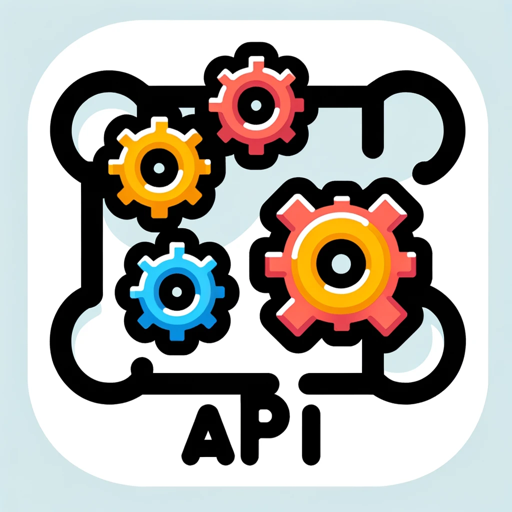API Alchemist-GPT API creation tool
AI-Powered API Creation Simplified
Can you generate an OpenAPI Schema?
What's the best way to deploy a GPT API?
Show me an example of your job
Help me build this tool:
Related Tools
Load More
API Docs
OpenAI API, GPTs, Documentation and CookBook

Algorithm Ace
Expert in advanced algorithms and data structures, providing clear and detailed explanations.

There's An API For That - The #1 API Finder
The most advanced API finder, available for over 2000 manually curated tasks. Chat with me to find the best AI tools for any use case.

API
An API expert, offering technical advice and examples.

Assistant API Builder
Agent specialist on building and deploying OpenAI Assistant API's
API Finder
Assists in finding and detailing APIs. Also guide users on how to effectively utilize APIs in their projects.
20.0 / 5 (200 votes)
Introduction to API Alchemist
API Alchemist is an advanced tool designed for creating and launching GPT-based APIs. Its primary function is to translate user requirements into functional and efficient code, utilizing various programming languages and frameworks. The tool is especially proficient in integrating with advanced tools like LangChain, AutoGen, and MemGPT, to create robust, customized solutions. An example scenario would be a user needing a custom chatbot for their e-commerce site. API Alchemist can generate the necessary backend code, create the API, and provide deployment instructions, ensuring a seamless setup process.

Main Functions of API Alchemist
Code Generation
Example
Generating FastAPI backend code for a GPT-3 based text generation API.
Scenario
A company wants to implement a text generation feature for their content creation platform. API Alchemist can produce the necessary FastAPI code, allowing the company to integrate GPT-3 capabilities into their existing system.
OpenAPI Schema Creation
Example
Creating a comprehensive OpenAPI 3.0.0 schema for the generated API.
Scenario
An API developer needs to ensure their API is well-documented and follows industry standards. API Alchemist generates an OpenAPI schema, providing clear and structured documentation for the API endpoints, request and response formats.
Deployment Guidance
Example
Providing step-by-step deployment instructions using Render.com.
Scenario
A startup with limited DevOps experience wants to deploy their new API quickly and efficiently. API Alchemist provides detailed instructions for deploying the API on Render.com, including the necessary setup commands and configurations.
Ideal Users of API Alchemist
Developers and Programmers
Developers looking to integrate GPT-based functionalities into their applications. They benefit from the tool’s ability to generate code, create schemas, and offer deployment solutions, saving time and reducing complexity.
Businesses and Startups
Businesses seeking to enhance their products with AI capabilities. API Alchemist provides an easy-to-follow process for creating and deploying APIs, making it accessible even for teams with limited technical expertise.

How to Use API Alchemist
Step 1
Visit aichatonline.org for a free trial without login, also no need for ChatGPT Plus.
Step 2
Define the specific API needs and determine the programming language you wish to use.
Step 3
Install necessary packages such as langchain, memgpt, autogpt, and openai using the command: !pip install langchain memgpt autogpt openai.
Step 4
Generate the code and OpenAPI Schema using the detailed instructions provided by API Alchemist. Customize as needed for your use case.
Step 5
Deploy the API on Render following the step-by-step guide, including setting up a GitHub repository and configuring the deployment commands.
Try other advanced and practical GPTs
Nutrition Advisor
AI-Powered Nutrition Insights.

Write Better Science
AI-powered tool to write better science.

ProductivePal
AI-powered productivity for ADHD management.

GptCode
AI-Powered Coding Solutions

Bash Scripting
Automate tasks with AI-powered Bash scripts

STEM-GPT | Enhanced Tutor |
AI-powered solutions for STEM success.

Boxing Match Simulator
AI-Powered Boxing Showdown: Real-Time Action & Commentary

Regex Helper
AI-powered regex assistance and testing.

GA4 Implementation Assistant
AI-Powered GA4 Tracking Setup

BibleGPT
AI-Powered Spiritual Guidance

Job Scout
Find Your Next Job with AI-Powered Precision

Woodblock Generator
AI-powered traditional woodblock print generator

- Data Analysis
- Automation
- Content Generation
- Chatbots
- Custom APIs
Common Questions about API Alchemist
What is API Alchemist?
API Alchemist is a tool designed for creating and deploying GPT-based APIs, utilizing frameworks like LangChain and MemGPT for robust solutions.
How do I start using API Alchemist?
You can start by visiting aichatonline.org for a free trial. Follow the setup steps to define your API requirements, install necessary packages, and generate your code.
Which programming languages does API Alchemist support?
API Alchemist primarily supports Python and frameworks like FastAPI. It also integrates with tools like LangChain, MemGPT, and AutoGPT for enhanced functionality.
Can I deploy my API using API Alchemist?
Yes, API Alchemist provides detailed instructions for deploying your API on platforms like Render, including setting up a GitHub repository and configuring deployment commands.
What are common use cases for API Alchemist?
Common use cases include creating customized GPT-based APIs for chatbots, automation tools, academic writing, content generation, and data analysis.